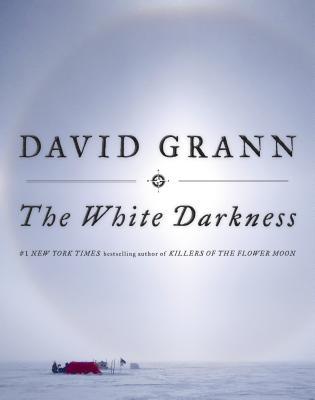I reckon I lost about three miles' distance today from snaking around, head permanently bowed to read the compass, just my shuffling skis to look at for nine hours. Anyway, I'm back on track and now happy I can part a straight line, even through another day of the white darkness.
~ Radio broadcast by Henry Worsley, two weeks into a solo transantarctic crossing
Author David Grann is known for spinning fascinating narrative nonfiction (as with Killers of the Flower Moon and The Lost City of Z), and frequent readers of his essays in The New Yorker might well assume that whatever is intriguing Grann at the moment will eventually be spun into a tale that will intrigue them, too. Even so, I found The White Darkness to be a little thin – at only 140 pages, including dozens of beautiful full page photographs, I really don't think that Grann made full use of what is, in fact, a potentially spellbinding tale. (And, in fact, I don't know that the book much improves upon Grann's original article on Worsley's story in The New Yorker.) The pictures in this slim volume, however, are admittedly stunning.
The format of the story is well chosen – We begin with Henry Worsley as he struggles to do what no one has done before: cross the continent of Antarctica by his own power, with no outside help, no prearranged food caches along the way, or even a cup of tea at the South Pole station that he passes en route. As his body weakens and his stomach cramps, Worsley must consider the lessons of the two earliest South Pole explorers who have fascinated him all of his life: Sir Ernest Shackleton, who turned back when a couple days short of the South Pole in order to get his men home safely; and Captain Robert Scott, who eventually did reach the Pole, and died alongside his crew on the return trip. The question Worsley must answer for himself: Is it truly better to be a live donkey than a dead lion?
The book then goes over a very brief history of Antarctic exploration, followed by a very brief history of Henry Worsley's life: he was always intrigued by tales of South Pole exploration, was fascinated to learn that he is distantly related to one of Shackleton's crew, joined the British army and did two tours with the SAS. When one of Shackleton's descendants reached out to ask Worsley if he'd like to join him and another early explorer's descendant to attempt to complete the trek to the South Pole at the centenary of their ancestors' failed attempt, Worsley jumped at the chance. The book covers that trip, a later polar trek that Worsley joins, and eventually, after Worsley ages out of the army at 55 and promises his family that his dream of a solo Antarctic crossing would be the last time he ever left them, we rejoin the story from the beginning: trudging along with Worsley as he skis and hikes and tows his sledge, avoiding crevasses, and making his solitary way through the mind- and muscle-numbing white darkness.
There's plenty of meat here for a full-length book, and I feel like Grann sold the story short; I do not feel fulfilled by this. Naturally, I kept reading to learn of Worsley's fate, but I would have happily stayed in this icebound world for quite a while longer.

